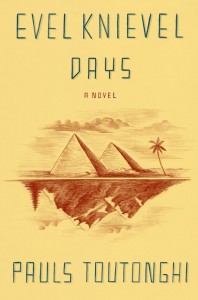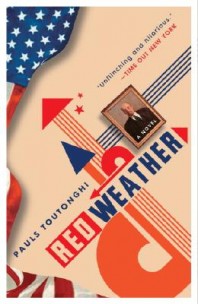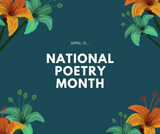 Pauls Toutonghi’s second novel, Evel Knievel Days, takes Khosi Saqr, a quirky, OCD-prone boy out of his comfort zone in Butte, Montana to Egypt in hopes of finding his estranged, compulsively-lying dad. It’s a novel worth celebrating, and that’s exactly what Toutonghi will do after his reading at Powell’s Books tomorrow night. The after-party will be at The Graeter Art Gallery, which coincidentally is showing an exhibit on vintage motorcycle art. The rockabilly punk band The No Tomorrow Boys will play a set, and, to top it off, PBR is sponsoring the party. Now that’s the way to toast a book release!
Pauls Toutonghi’s second novel, Evel Knievel Days, takes Khosi Saqr, a quirky, OCD-prone boy out of his comfort zone in Butte, Montana to Egypt in hopes of finding his estranged, compulsively-lying dad. It’s a novel worth celebrating, and that’s exactly what Toutonghi will do after his reading at Powell’s Books tomorrow night. The after-party will be at The Graeter Art Gallery, which coincidentally is showing an exhibit on vintage motorcycle art. The rockabilly punk band The No Tomorrow Boys will play a set, and, to top it off, PBR is sponsoring the party. Now that’s the way to toast a book release!
Toutonghi is an Assistant Professor of English at Lewis & Clark College in Portland. His first book, Red Weather, came out in 2006 (and they celebrated appropriately for that release too).
Toutonghi took some time out of his revelries to talk with Village Books’ Lindsey McGuirk about Evel Knievel Days, music and kibbeh.

“Evel Knievel Days is such a fun read and you’re going to want all your friends to read it as well. Make sure you get your copy back, though. You’ll want this one displayed on your bookshelves.—Lindsey McGuirk. Click on the book cover above to buy ‘Evel Knievel Days’ from Village Books.
LM: There are many references to country music and singers in your book. You clearly love old country music. For someone who doesn’t listen to it, will you recommend a good starting point?
PT: What a terrific first question. So, much of the “country” music of today, sadly, is a pale imitation of what it used to be, with some notable exceptions like Jimmie Dale Gilmore or Lucinda Williams or Gillian Welch. I think that the songs I love have their roots in the Appalachian music that was first recorded, broadly, in the 1920s. Its influences, in turn, were rural English, Irish and Scottish music from the 18th and 19th centuries mixed together with the banjo music of African-American slaves and old religious hymns. What I love are sad songs with plaintive melodies and big harmonies. I also love the early blues and pretty much any early, early folk. Here’s a little playlist:
1. Jimmie Rodgers, Waiting For a Train
2. Kitty Wells, It Wasn’t God Who Made Honky Tonk Angels
3. Ray Price, Heartaches by the Number
4. Charlie Poole and The North Carolina Ramblers, He Rambled
5. Sonny Boy Williamson, Bye Bye Bird
6. Bob Wills and his Texas Playboys, Trouble in Mind
7. The Carter Family, No Depression in Heaven
8. Uncle Dave Macon, Sail Away Ladies
 LM: All of these songs are fantastic! And I love the sound quality of old recordings like these. Listening to these songs reminds me of summers hanging out at my grandparents’ camper when I was little. Have you ever heard Conway Twitty’s Don’t Cry Joni? We often listened to that song. It absolutely crushes me.
LM: All of these songs are fantastic! And I love the sound quality of old recordings like these. Listening to these songs reminds me of summers hanging out at my grandparents’ camper when I was little. Have you ever heard Conway Twitty’s Don’t Cry Joni? We often listened to that song. It absolutely crushes me.
PT: That’s a good one, yes. His daughter, Joni, was 15 or 16 when they recorded that, I think. It packs a punch.
LM: Your writing is very funny and, especially the exchanges between the main character, Khosi, and his mother. Is that humor reminiscent of your own personality?
PT: I think that writers have the luck to sit there for days and think about the best line, the wittiest comeback for their characters to say. Often, in life, I go home from the party and then, lying in bed, I think of the funny thing I should have said at the party. Khosi is lucky that he’s written, and not real. Actually, I sort of wish that I could be a character from a book. It would be freeing to believe that there was an author controlling it all, working behind the scenes.
LM: Have you ever seen Stranger Than Fiction with Will Ferrell and Emma Thompson? Will Ferrell’s character is a character in a book, but he has no idea. I love the movie.
PT: I love that movie, too. Ferrell has more dramatic range, I think, than people give him credit for. I think he’s pretty great in serious roles, as well. Of course, he’s excellent in Anchorman, too.
LM: You write about William Andrews Clark, a jack-of-all-trades businessman who lived in Montana in the late 1800’s. His role in the book is brilliant! When did you first learn about him and how did you decide to incorporate him into the book?
PT: William Andrews Clark was the inspiration for the book, actually. I started writing a very different novel, one about the war between the two main rival copper kings in Butte, Montana, William Andrews Clark and Marcus Daly. But it didn’t work. And so the ghost of that book, quite literally, haunts this book. Clark also left behind that incredible mansion, the Copper King Mansion in downtown Butte, and when I stumbled across it on vacation in Montana, I realized that this is where the book is set.
LM: There are so many scenes in your book that involve Egyptian food and cooking. Do you cook? If so, will you cook me some kibbeh?
PT: I cook! I love to cook. I grew up surrounded by those recipes. Most of them are my grandmother’s— the mulukhreya, the kibbeh, the grape leaves. My parents both cooked, although my mom was more northern European in the dishes she prepared, and my dad, of course, inherited my grandmother’s Egyptian and Lebanese recipes.
LM: So I’m gonna take your lack of response to cooking kibbeh for me as a no.
PT: I would be happy to cook kibbeh for you. But how would we orchestrate it? I could make some and ship them via FedEx?
LM: That’s ok. I don’t know that the meat would make the trip. You’re a professor at Lewis & Clark College and have taught a class on the rock ‘n’ roll novel, which is so fantastic! What songs would make up the soundtrack for Evel Knievel Days?
PT: Well, this is a difficult question. I listened to a number of different things while writing the book—and those songs are tied up with the text, in my mind. I listened to a lot of Bach, The Well-Tempered Clavier and Ratatat. I think that there would be some of these songs in the soundtrack, but lots of country-and-western, as well. Basically, I’d just like to hire Mark Mothersbaugh to make the soundtrack. He did most of Wes Anderson’s soundtracks.
LM: Wouldn’t it be great to have Mark Mothersbaugh do the entire soundtrack to your life? Like, here’s the song he wrote for when I brush my teeth in the morning. Or here’s the song he wrote to accompany me taking out the trash.
PT: Or here’s the song he wrote for me to tie my shoes. Every mundane act would suddenly be an act of astonishing beauty. How about these twelve songs for my soundtrack:
1. Intro credits — Jimmie Rodgers, Waiting for a Train
2. Scene with mother — Sonny Terry & Browning McGhee, Sittin’ On Top of the World
3. Scene with Natasha — Ray Price, Heartache by the Numbers
4. Sex scene — Bjork, Bachelorette
5. Driving scene — Ratatat, Loud Pipes
6. Tante Wada flashback — Amr Diab, Habibi Ya Nour El Ain
7. Arrival in Egypt (hotel with view of city) — Gillian Welch, Everything is Free
9. Scene with thugs (chase) — Bach, Well-Tempered Clavier, Book 1, Prelude 1 in C
8. Scene with father (backgammon) — Mos Def, Quiet Dog
10. Illness — Fleet Foxes, White Winter Hymnal
11. Party scene — The Clash, Police On My Back
12. Closing credits — The National, Afraid of Everyone
LM: Gillian Welch has such an incredible voice. She’s a powerhouse, that one. I’d never heard Everything is Free, but what a gorgeous song. And wow! Good call on “Bachelorette” for the sex scene. Make sure that’s added into the contract when the book is optioned for film.
PT: If only I could control that!
LM: Who is an author that knocks your socks off?
PT: Anthony Doerr. His stories astonish me and his prose just gets better the more you read it.
LM: What are you currently reading?
PT: Ha! Since my wife and I had twins two years ago, I’m reading a lot of Goodnight Moon. And Green Eggs and Ham. And How Do Dinosaurs Clean Their Rooms? That’s a favorite in the household, currently.
LM: I’d also recommend The Monster at the End of This Book. It’s the best in the Little Golden Book series, by far.
PT: I will check it out!
Lindsey McGuirk is Village Books’ Digital Marketing & Publishing Coordinator. She also handles the store’s online marketing and works with authors to get their books published on the print-on-demand Espresso Book Machine.


